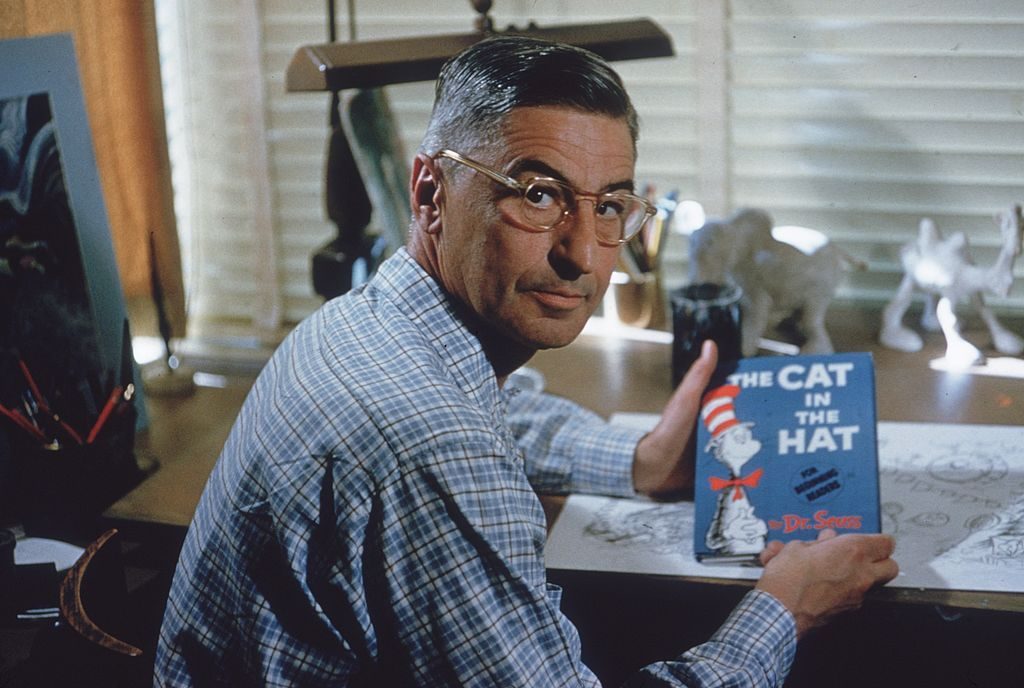
Dr. Seuss was the real Grinch as the world now reckons with his racism
Six of the beloved children’s author’s books are being removed from bookstores for racist imagery.
Six books written by the beloved children’s author, Dr. Seuss will no longer be published or sold, due to racist and insensitive imagery.
If I Ran The Zoo, Mulberry Street, McElligot’s Pool, On Beyond Zebra!, Scrambled Eggs Super!, and The Cat’s Quizzer are now being removed from the shelves of bookstores.
According to Dr. Seuss Enterprises, the business that preserves and protects the author’s legacy, these books portray certain groups of people in ways that are inaccurate and harmful.
“Ceasing sales of these books is only part of our commitment and our broader plan to ensure Dr. Seuss Enterprises’ catalog represents and supports all communities and families,” it said.
Dr. Seuss, who died in 1991, remains an immensely popular author. His work has been translated into dozens of languages, including braille, and his famous books are sold in more than 100 countries.
Although Dr. Seuss is adored by millions around the world for many of the positive values in his books, criticism has grown in recent years over the way Black people, Asians and others are illustrated in some of his books, as well in his early advertising and propaganda.
In the 2019 study, “The Cat is Out of the Bag,” Katie Ishizuka from the Conscious Kid Library and Ramón Stephens from the University of California, dissected 50 of his books.
The report found that 43 of the 45 characters of color had characteristics aligned with anti-blackness, Orientalism and white supremacy.
It also noted that Seuss published anti-Semitic and anti-Black cartoons in a magazine in the 1920s, as well as anti-Japanese propaganda during World War II.
No one is "canceling" Dr. Seuss.
— Nick Jack Pappas (@Pappiness) March 2, 2021
Dr. Seuss Enterprises made the decision to stop publishing six books, like the one below. It's obviously racist.
Yes, Dr. Seuss evolved. Anyone can.
Show me someone upset about this and I'll show you someone unwilling to evolve. pic.twitter.com/u6Gh8Irm1P
Dr. Seuss Enterprises made the decision to cease publication and sales of these six books after months of deliberation. They received feedback from teachers, academics and specialists in the field and then worked with a panel of experts, including educators, to review their catalog of titles.
In 1937, Dr. Seuss published his first book, entitled And to Think That I Saw It on Mulberry Street. The book contains an illustration of an Asian person with wearing a cone-shaped hat, holding chopsticks and eating from a bowl. The character is described as a “Chinese man who eats with sticks.”
An image from this book was removed from the Amazing World of Dr. Seuss Museum in 2017 after complaints about the “jarring racial stereotype.” Three authors, Mo Willems, Mike Curato and Lise Yee co-signed a letter calling for its removal.
“We find this caricature of ‘the Chinaman’ deeply hurtful, and have concerns about children’s exposure to it,” they wrote.
RELATED CONTENT
In The Cat’s Quizzer, a character is simply referred to as “a Japanese,” and is drawn with a bright yellow face, standing on what is assumed to be Mount Fuji.
Arguably the most troubling depictions appear in the book, If I Ran A Zoo, where all the characters of color are dehumanized and put in positions of subservience.
Love how everyone in the #cancelcancelculture tag thinks we're "canceling" dr. seuss because we're offended by nursery rhymes, when in reality all that happened is Dr. Seuss Enterprises made the decision (unprompted by Twitter) to stop publishing six of his books because of this pic.twitter.com/V0lNCgaJvY
— D'Angelo Wallace (@dangelno) March 3, 2021
In the book, a white man declares his intention is to put a “chieftain” (drawn as a man in a turban) on display in the zoo.
A group of Asian characters are shown carrying a caged animal on their heads, and they are described as “helpers who all wear their eyes at a slant,” from “countries no one can spell.”
As if that wasn’t problematic enough. Dr. Seuss depicts the only two Black characters as monkeys, keeping alive the long-held violent trope of comparing Black people to primates.
The move to cease publication and sale of Seuss’ books drew immediate criticism from Fox News anchors, who called it another form of “cancel culture.”
I count 85 mentions of "Seuss" on Fox News today as of 4 p.m via closed caption., they've covered his purported cancelation every hour since 4 a.m., saying his name an average of 7 times an hour. https://t.co/lBUXE2WNGp
— Matthew Gertz (@MattGertz) March 2, 2021
But not all the reactions were negative.
Rebekah Fitzsimmons, an assistant teaching professor at Carnegie Mellon University took to Twitter to share an important reflection on the power of books, especially when it comes to molding young minds.
“The books we share with our children matter. Books shape their worldview and tell them how to relate to the people, places, and ideas around them. As grown-ups, we have to examine the worldview we are creating for our children, including carefully re-examining our favorites,” she wrote.











LEAVE A COMMENT: